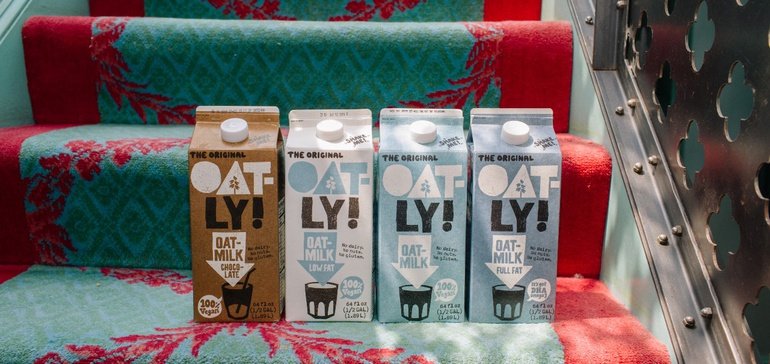Oatly accused by short seller of overstating revenue and sustainability efforts

Dive Brief:
- Oatly is being accused by short-seller Spruce Point of overstating its revenue and margins and misleading the public about its sustainability efforts in a 124-page report published Wednesday. Oatly did not respond to a request for comment at press time.
- Spruce Point, which has a short position in Oatly — meaning it makes money if the stock price falls — wants Oatly’s board to have an independent forensic accountant open an investigation into its claims. “Spruce Point finds evidence that revenues, gross profits, inventory, capex, and employee accounts are inaccurate. Thus, we call into question the accuracy of Oatly’s entire financial statements,” the firm wrote in its report. It also accuses Oatly of overstating its sustainability contributions, locating its plants far from where oats are grown, and having wastewater issues at its facilities.
- Oatly completed its IPO in May as the maker of oat-based milks, yogurts and frozen desserts capitalized on growing consumer demand for plant-based offerings. Oatly entered the U.S. in 2016, and last year posted a loss, despite selling $421.4 million worth of products in 20 countries worldwide.
Dive Insight:
Spruce Point has built its reputation on taking publicly traded companies to task for what it defines as misleading statements and disclosures. Oatly, which hasn’t even had a quarterly financial report since its IPO in May, is the latest company that the firm says has overstated its financials and sustainability impact.
According to its registration filing with the U.S. Securities and Exchange Commission, Oatly is still operating at a loss — $60.4 million in total last year, just about doubling the $35.6 million loss of 2019. In its filing, the company says it believes it can become profitable as it increases its production capacity and continues to expand globally. But in its report, Spruce Point disagrees.
“We believe Oatly will sorely disappoint investors and will never achieve profitability,” the report says.
Oatly, according to the report, has multiple accounting and financial control weaknesses, and has gone through three auditors in six years. The company’s CFO and audit chair were both previously involved in companies with corporate accounting scandals, it notes. And the company’s stock, which had been worth more than $22 a share on Tuesday, is far overvalued, the report says.
“We don’t think any of this is in the narrative at the moment,” Spruce Point founder and Chief Investment Officer Ben Axler said in an interview with CNBC. “We think this is a strong sell, and the stock price could be 70% overvalued.”
Since Oatly first entered the U.S. market in 2016, it’s been seen as a trendy and sustainable plant-based player. The Swedish company is credited with inventing oat milk in the 1990s and helped propel it to become the second most popular alternative dairy milk in the United States last year, according to SPINS. Oatly’s popularity accelerated during the pandemic, with oat milk being one of the biggest beneficiaries of pandemic-influenced grocery shopping.
Shortages and an investment from the environmentally controversial developer Blackstone couldn’t sink the brand’s popularity. Instead, Oatly used these issues as opportunities, expanding its U.S. manufacturing footprint and using Blackstone’s investment to show how it can help a company look at sustainability in a new way and change. As trading of Oatly’s stock began in May, CEO Toni Petersson said in an interview that he saw only opportunities for growth.
It’s not clear if this report might be the thing that slows Oatly down. Spruce Point has targeted other companies in the food space, including the former Boulder Brands and Arm & Hammer owner Church & Dwight Co. Its 2013 report on Boulder Brands detailed accounting issues. The then-CEO of Boulder Brands would later resign, and the company was bought by the former Pinnacle Foods soon after.
Sustainable plastics company Danimer Scientific, which went public in December through a deal with a special purpose acquisition company, is a more recent Spruce Point target. The short seller published a report in April attacking the company’s claims of making biodegradable plastic — which was also discussed in a Wall Street Journal article — as well as claiming corporate governance red flags from some of the its executives. Updates to the initial Spruce Point report were published in May, and the securities regulator in Kentucky, where Danimer has a production facility, has launched an inquiry into the complaints. But to this point, Danimer’s stock price has stayed fairly consistent since the Spruce Point report came out.
Considering Oatly’s track record of smart-tongued and sharp responses to critics, it can be expected that the company will have a witty response to the Spruce Point report at some point. It remains to be seen if that ethos — and the brand’s mega fans — will keep the larger criticism from sticking.
Source: fooddive.com

